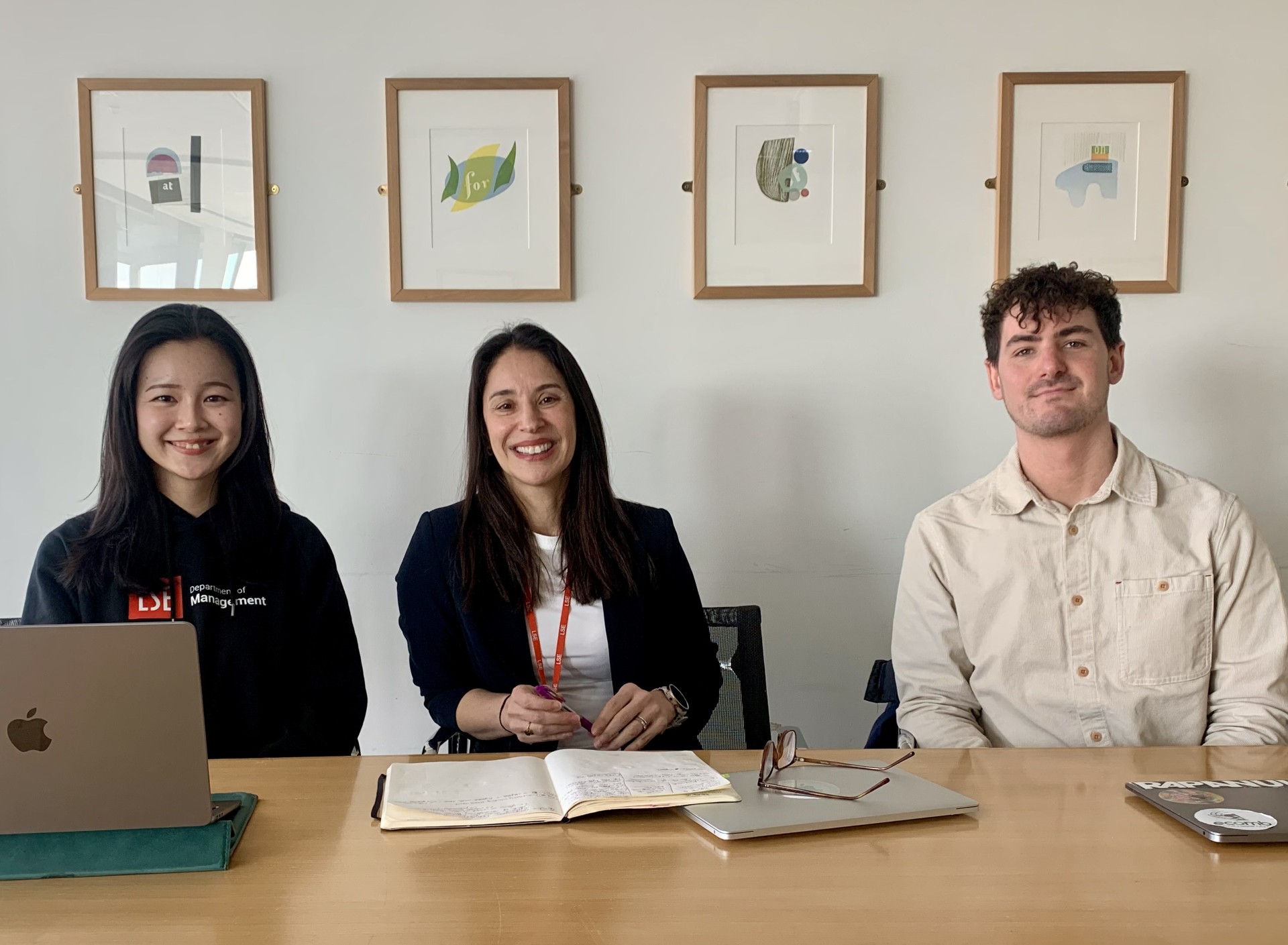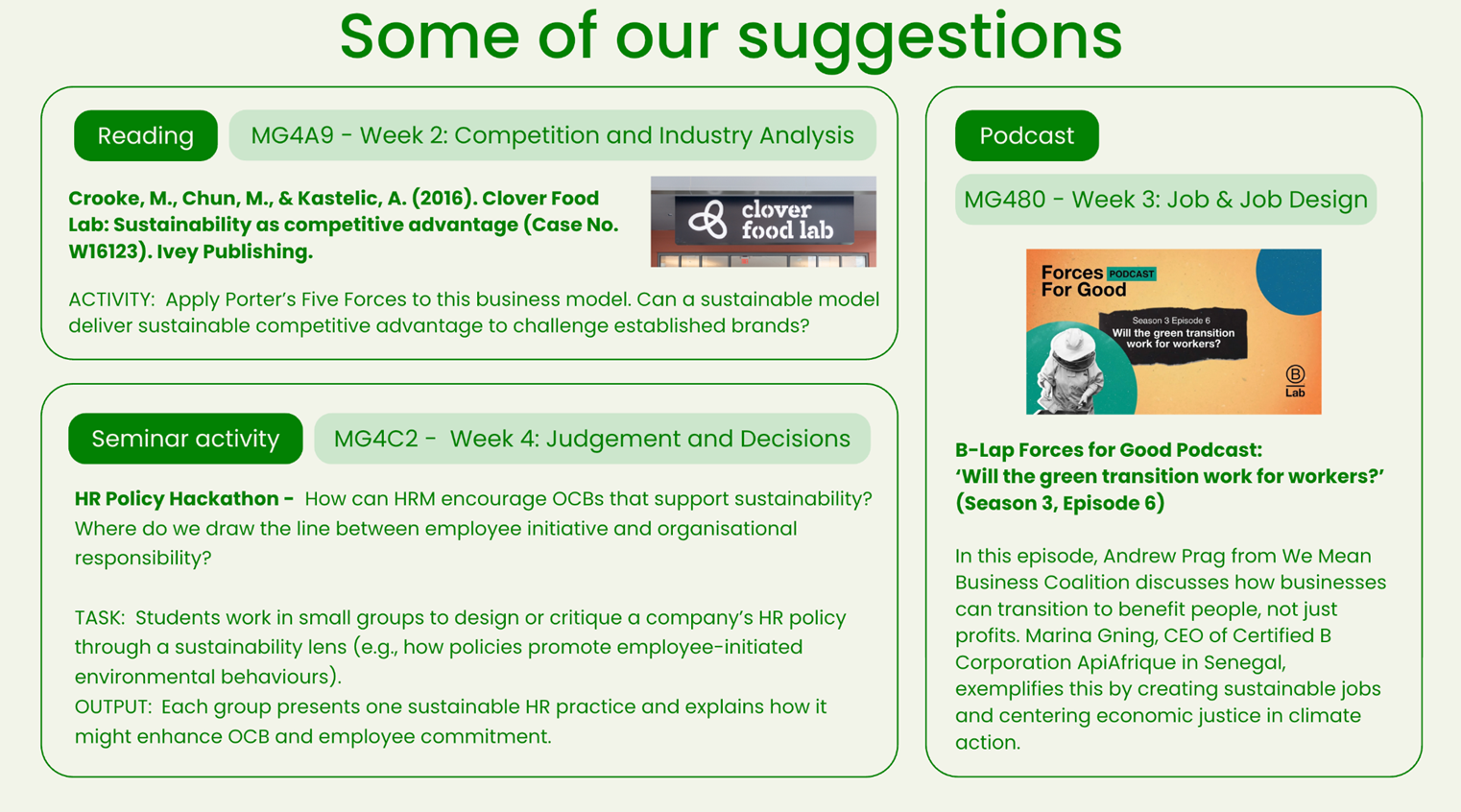Mapping sustainability across LSE’s MSc Human Resource and Organisations curriculum.
This year, we joined LSE’s Education for Sustainability (EfS) project to work on the MSc Human Resources and Organisations (HRO) programme. Our task: to explore sustainability across the programme and how it might be enhanced.
Unlike most EfS projects that focus on individual courses, we looked at the programme holistically. This meant reviewing all core modules to understand how sustainability is introduced to HR students. It was a challenge that pushed us to think differently—not just about education, but about the role HR plays in the world.
Sustainability has always been close to our hearts. But before this project, we hadn’t fully realised how vital human resource management (HRM) is to building a more sustainable future. We came away understanding that HR has a pivotal role to play in tackling today’s big challenges—from climate change to inequality.
So… what does sustainable HRM mean?
Does it mean having a few green policies, maybe more recycling bins in the office? Not really, it’s a whole lot deeper than that!
Sustainable HRM is about managing people in ways that support not just business goals, but also the well-being of society and the environment. It’s about long-term thinking and asking big questions: How can HR help solve global problems? How can workplaces become more ethical, inclusive, and future-focused?
HR already plays a central role in delivering organisational goals. What we hadn’t realised was just how far that influence can reach. With a sustainability mindset, HR can drive change beyond the office walls—and it can, quite literally, help shape a better world.
Sustainability isn’t just a side topic for HR—it should be part of how we think about the profession as a whole.
The EfS project
We worked closely with Dr. Bethania Antunes, the HRO programme director, to review the curriculum with sustainability in mind. Our job was to identify where sustainability was already being taught and identify gaps or missed opportunities.
We reviewed course overviews, reading lists, lecture slides and seminar activities. Then, we mapped patterns and themes to get a clearer picture of how sustainable HRM fits into the curriculum.

Our findings
One of the biggest surprises was realising how much of the curriculum already touches on sustainability—just not always explicitly. Through the lens of sustainable HRM, we saw that themes like fairness, inclusion, and social responsibility were already deeply embedded. It helped us see familiar content in a completely new light.
That said, these connections often weren’t clearly signposted. The ideas were there, but not always framed within a broader sustainability conversation, making it harder for students to connect the dots, especially if they’re not already thinking about HR in that way.
Environmental sustainability, in particular, stood out as a gap. While HR might not be the first thing that comes to mind in discussions of climate action, people professionals play a vital role in shaping workplace behaviours, values, and culture. From supporting green practices to engaging staff in sustainability goals, HR has huge potential to lead the way.
In short: a lot is already happening—but there’s still room to make sustainability more visible and fully integrated.
Our recommendations
We didn’t just spot gaps—we offered ideas too, like:
- Signposting sustainability more clearly across modules (i.e, in learning outcomes)
- Adding seminar activities, case studies and podcasts highlighting sustainable HRM
- Bringing in guest speakers from B-Corps or sustainable HR teams
Crucially, we believe students and professionals alike should be asking: How can my HR practices contribute to a greener, fairer, more equitable world?

Reflecting back
Reina: “As someone who may return to academia, getting to contribute to curriculum design, especially with a sustainability focus, was an exciting experience. It challenged me to think about how we can prepare future HR leaders to work with purpose, and opened my eyes to the role of learning and development in building forward-thinking HR.”
Bryce: “As a B-Corp advocate (and former teacher!), this project was especially meaningful. It made me think not just about what’s taught, but how, and how curriculum design shapes future HR thinking. As LSE student reps, Reina and I also leaned on what we know students love: interactivity, real-world case studies, and multimedia to keep learning engaging.”
We picked up skills we didn’t expect, from curriculum mapping to critical analysis, and left with a renewed appreciation for HR’s role in tackling social and environmental challenges.
What’s next?
We hope future MSc HRO students graduate not just with technical knowledge, but with the mindset to become sustainability ambassadors. That means recognising sustainability isn’t just a side topic for HR—it should be part of how we think about the profession as a whole.
And for us? We continue to ask: how can HR become a driving force for sustainability in both organisations and the wider world?
- This blog post represents the views of its author(s), not the position of the London School of Economics and Political Science Department of Management.
The post Rethinking Human Resources through a sustainability lens first appeared on LSE Management.
